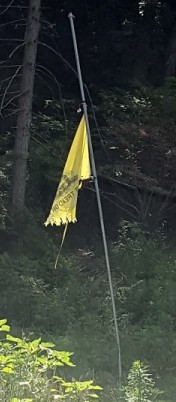 am writing to you from the darkness that is the year 2021. In our time,
almost every piece of news, every scrap of entertainment, and every
advertisement is political propaganda. Almost nothing anyone says
is credible. We in the year 2021 live in an information desert.
am writing to you from the darkness that is the year 2021. In our time,
almost every piece of news, every scrap of entertainment, and every
advertisement is political propaganda. Almost nothing anyone says
is credible. We in the year 2021 live in an information desert.
Anyone who challenges received opinion risks being ostracized from society, fired from their job, and having their credit card canceled. We're a short step away from the stage where expressing an incorrect opinion gets you thrown in prison. The next stage for us will likely be for our electricity to be cut off and our mortgage canceled.
Why is this happening? We are witnessing the death struggle of the legacy corporate media, which hope to survive by doting on the comments of their Twitter proxies, while Twitterers do their dirty work of suppressing conflicting opinion and inventing new narratives to prop up the corporate media.

My neighbor flies a tattered Gadsden flag at half-staff. Note the six-foot-tall weeds in the front lawn. No HOA, and a tiny oasis of liberty!
The opponents respond by ignoring corporate advertisements, treating all news as fake news, regarding anything taught in a school or spoken in public or at a university or a corporation as a lie, and speaking to others only about specific technical matters or in vague generalities. Culture was the main victim: in our time, taping a banana to a wall with duct tape was considered high art.
Even our scientific funding agencies became politicized. Program announcements were increasingly focused on “equity”—a political term that meant justifying government redistribution of resources rather than finding cures for diseases or making fundamental discoveries. Hiring at many universities was contingent on the applicant writing a convincing fiction about having practiced “diversity” and “anti-racism”—‘woke’ code words for discriminating on the basis of race.
No one with an independent mind could believe that anything produced in such institutions qualifies as knowledge. Indeed, we saw articles in top medical journals claiming that the binary distinction between male and female is “problematic” and that global health practice is an “enabler of European colonization of much of the rest of the world.”[1] Most scientific journals still clung to truth, but their editors knew change was coming.
Once I tried creating a list of phony ideas we are being pressured to believe. Some appeared political (a euphemism for hate-based). Others seemed irrational, self-contradictory, racist, or sexist. What they had in common was the essentialist idea that our beliefs are determined by our social and ethnic identity. The advocates of these ideas imagine they are above criticism because they believe they can never be wrong. In this milieu, skeptics automatically become ‘deniers’. The goal is to assert that truth can be determined by authority, and then to claim that authority.
I also gave up trying to understand my left-wing friend. I would ask why they believed this or that, sometimes pointing out the logical flaw in the idea. Always in response I'd get an argument based on the supposed authority of an unidentified person in the press. Often it would be backed up by denial and layers of falsehoods, most coming from news media reports.
This is why censorship is such an effective strategy. People's opinions are based on what they believe to be true. Change what they can hear, and you change their opinion. Pointing this out is a hopeless task: the followers of ideas believe them because they want them to be true, and because their social status is threatened if they reveal doubt. But censorship only works when people don't know it's happening.
Truth and logic are our tools to understand the world. The loser is our ability to distinguish truth from falsehood. But if you try to run a society on falsehoods, you will eventually get chaos.
The 2020s were mostly a cultural and intellectual desert, when nothing anyone said was credible. But we took solace in the fact that any ideology based on falsehoods contained the seeds of its own destruction. Logic designed to silence one's opponents was a red flag that it is invalid. In our time we can't yet see how it will end, nor can we know whether science will find a way to thrive. But what is clear is that it cannot last.
1. Yam EA, Silva M, Ranganathan M, White J, Hope TM, Ford CL. Time to take critical race theory seriously: moving beyond a colour-blind gender lens in global health. Lancet Glob Health. 2021 Apr;9(4):e389-e390. doi: 10.1016/S2214-109X(20)30536-2. PMID: 33539778. https://www.thelancet.com/journals/langlo/article/PIIS2214-109X(20)30536-2/fulltext
july 06 2021, 5:44 am
